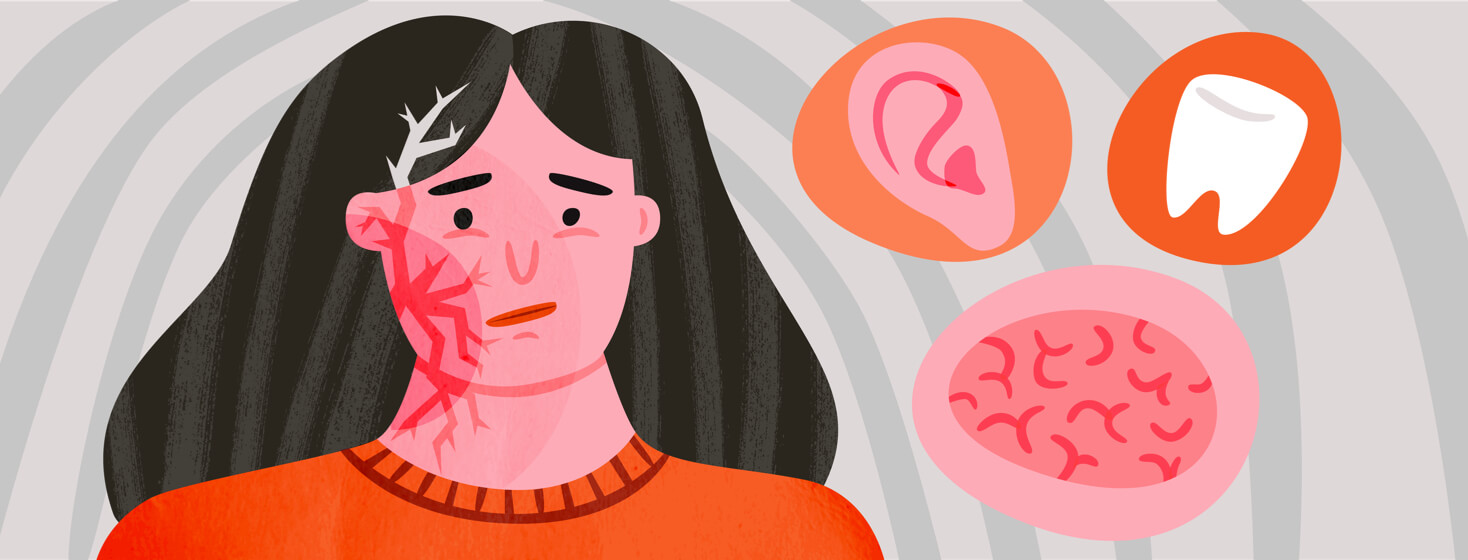5 Ways Jaw Arthritis Affects My Entire Body
Whenever psoriatic arthritis is active in my jaw, I smell of Bengay. Not only do I use it on the sides of my face, but I use it on my shoulders, neck, and even temples.
Sometimes loved ones are confused when they see me use the cream all over. But they often don't realize how much these types of flares affect my entire body- not only my mouth.
The inconvenience of psoriatic jaw pain
I find TMJ flares to be extremely intrusive. While they don't leave me completely immobile the way a hip flare does, it does cause agonizing pain all over my body.
Thankfully, I rarely experience all these symptoms simultaneously. Many people may experience one or two of these symptoms at a time during a flare, but may not during times of lower disease activity.
In my experience, active jaw arthritis severely affects my body in these following five different ways:
1. Toothache
It's not surprising that a jaw flare can irritate your teeth. For two months, I had a flare-up that woke me up at 2 am every day from toothache. Since the pain made it hard to brush and floss, I was worried my teeth were aching due to infections or cavities.
I swore one of my molars was going to burst out at any moment! But every time I inspected my gums, everything was perfectly fine. The pain was just the inflammation from the jaw coming to irritate my teeth.
It's a good idea to go to the dentist if your teeth hurt during a flare, especially because people with psoriatic disease are at a higher risk of developing gum disease. You may also be clenching your teeth in response to dealing with pain in other joints, which may be causing additional jaw and tooth pain.
2. Facial tenderness
I never realized how badly my face could hurt or how achy my cheeks could feel. Dysfunction of your jaw can cause facial pain and tenderness. For me, it feels as if I've been wearing a fake smile all day. There were even times I felt like I couldn't keep my eyes open because my face felt so tired.
I find using hot and cold compresses soothing to the facial pain. Sometimes, I treat myself to draping a warm towel on my face and placing cucumber slices on my eyes. The bit of pampering helps to relieve the tenderness. But when the pampering isn't possible, taking a moment to wash my face with cold water helps a little bit.
3. Neck pain
Unfortunately, psoriatic arthritis has made its way to my neck. I've had plenty of flares unrelated to my jaw that made it impossible to move my neck! But having a TMJ flare make the pain and stiffness even worse.
As much as possible, I try to avoid postures and positions that irritate my neck during flares. I try not to stare down at my phone or crane to look at my computer screen. When I can't avoid doing these things, I take frequent stretch breaks.
Sleeping can also cause a lot of pain. Using a travel pillow, rolled towels, or even stuffed animal can help support your neck into a more comfortable position. You may also find it less painful to sleep in a recliner.
4. Headaches
Headaches are no fun, but they can be especially unpleasant during a flare. Tension headaches can be triggered by the extra inflammation and stiffness of the muscles in your head, neck, and shoulders.
I also sometimes get a stabbing pain behind my ear. It can be hard to keep headaches from coming up, but I find that the more I can keep my neck and shoulders relaxed, the less likely I am to have trouble.
5. Earache
To top it all off, the inflammation in your jaw can irritate your inner ear. While I haven't dealt with this too much, the earache can be quite intense. I've had stabbing sensations in the past, but it depends on the severity of the flare.
Treating jaw pain
The first step in treating jaw pain is seeing a dentist. You may need to be referred to an oral surgeon or TMJ clinic. They often recommend treatments such as therapy, splinting, medicine, jaw injections, and acupuncture.
It's also important to let your rheumatologist know what's going on. While they may not be able to do a ton for your jaw, they will want to keep an eye on it and any other joints that seem irritated.
Monitoring it can also help clue them into which treatments are working and which aren't. They may also be able to make recommendations for pain relief.
Keeping the jaw pain under control
I've had trouble treating my jaw pain in the past. But for me, the most helpful things are getting on treatments that reduce my inflammation and wearing my retainers at night.
I also try to do TMJ exercises and stick to a soft food diet when I notice my jaw is starting to act up. It may not sound like much, but it's helped me keep the pain a little more under control.

Join the conversation